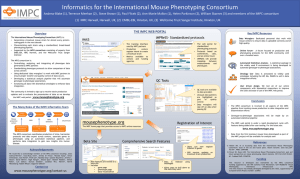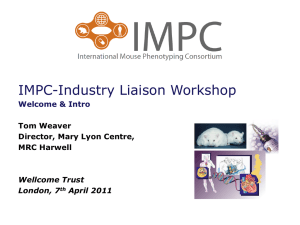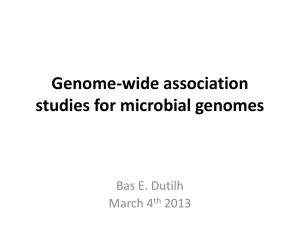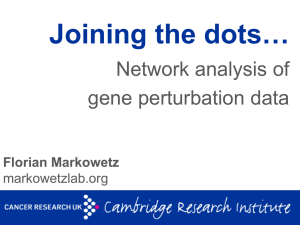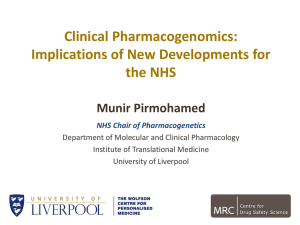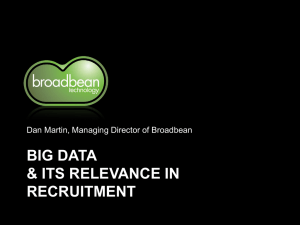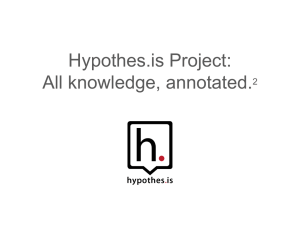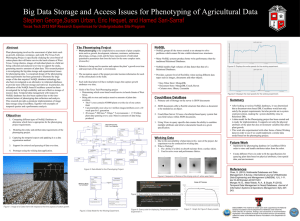SOP Status, QC, and Data Wrangling KOMP2 Meeting Washington
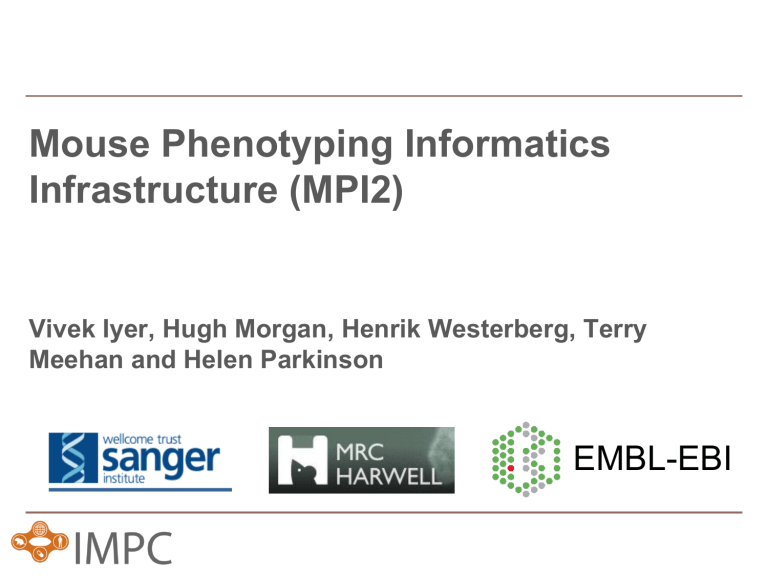
Mouse Phenotyping Informatics
Infrastructure (MPI2)
Vivek Iyer, Hugh Morgan, Henrik Westerberg, Terry
Meehan and Helen Parkinson
EMBL-EBI
Center
Phenotypers
Data Managers
IMPC
Pipeline
LIMS
Export
MPI2
Analysis
Present
• Centers all around the world collaborating in IMPC
• Each center producing data from 25 different phenotyping procedures
• Organizing, comparing and integrating
MPI2 consortium
BaSH
JAX
DTCC
Data Flow
KOMP2 other
IMPC partners
Tracking
SOPS
Data Validation
Analyze
Integrate
Disseminate
Achieving IMPC informatics goals
• Coordinate
• Standardize Protocols & Data Wrangling
• Validate
• Analyze & Archive
• Integrate & Disseminate
DATA TRACKING
Basic tracking system available to production centers
Advanced tracking system
Tracking portal
SOPDB
Review SOPS proposed by centers and complete version 1
Version 1 of SOPDB
Version 2 of SOPDB based on new guidelines
Extend SOPDB web portal with use case defined functions
Refine SOP defintions and manage versioning
Pheno-DCC
Review data export and upload process
Set up LIMS export with centers
Design and implement Pheno-DCC database schema
Develop export module
Validation and QC tool development
Image upload tools
Image annotation specification and tool development
Data management system complete and exported to portals
2011-12 2012-13 2013-14 2014-15
Statistical Analysis and Data Annotation
Review experimental design of SOPs
Modular Annotation Pipeline V1
Incorporation of EBI R analysis infrastructure
Incorporation of added value data sets
Modular Annotation Pipeline V2
CDA and IT infrastructure
Data warehouse
KOMP2 Web Portal
High priority portal use cases (D4.2.1)
Medium priority portal use cases(D4.2.2)
Low priority portal use cases (D4.2.3)
Further development incorporating new use cases
2015-16
Detailed Overview
• Coordinate
- Tracking: Vivek Iyer
• Cross center integration
- Phenotype procedures and data wrangling: Henrik
Westerberg
• Validate
- Data upload and QC: Hugh Morgan
• Analyze & Archive
- Central data archive- Terry Meehan
• Integrate & Disseminate
- Plans for the future- Helen Parkinson
iMITS Core function
PLANS
STATUS
IMPC
Production &
Phenotyping
Centers iMITS
Report
…
KOMP2 other
IMPC partners
iMITS Users
Production centers input data
Other production centers compare data
NIH Monitors progress
IMPC Portal displays progress to community
Production &
Phenotyping centers iMITS
Production &
Phenotyping centers
NIH
IMPC
Portal
iMITS Value
Production &
Phenotyping centers
1. Consistent
Input format iMITS
2.
Spot dups
Production &
Phenotyping centers
3. Production monitored
NIH
1.
CONSISTENT STATUS INPUT
ALL centers PROVIDE SAME FORMAT
2.
AVOID accidental Duplication Of Effort
3. CONSISTENT REPORT OUTPUT (comparison)
IMPC
Portal
IMITS Data Capture
GENE ES Cell QC
1.
PLANS and pre-production
ES QC Statuses
MI Chimeras
Mutant
Mice
2. Production
Status, Strains
Genotyping Assays
3. Phenotyping
Statuses, Strains
Rederivation
Of Mutant Mouse
Cre-Excision
(Generation of null)
Phenotype
Data to DCC
iMITS Planning reports
GOAL:
To avoid unintentional duplication of effort
SUCCESS this year
Consortia could avoid duplication before production
Small number of visible duplications
CHALLENGES
Known duplication to be flagged as intentional
Actively pushing duplication to producers
iMITS Avoiding duplication
GENE X
GENE X
GENE X
BaSH
Interest
JAX
Interest
BaSH
Conflict
JAX
Conflict
Discussion …
BaSH
Withdraw
JAX
Assigned
JAX
ES QC starts
Possible
Double
Production
Reported
iMITS Reporting duplication
DOUBLE-PLANNING REPORTS via iMITS REPORTS page
“MATRIX” collisions reported with details of each plan
EACH collision must be inspected
iMITS Reporting duplication iMITS shows this report
Consortium Double-plans or production inside KOMP2
BaSH 5
DTCC
JAX
5
0
DETAILS can be inspected …
CHALLENGE: We need to actively push to producers
iMITS Production reports
Totals
Monthly
SUCCESS this year
Consistent, Timely Production Reporting
Standard formats for Totals and Monthly Activity
Computer updates from all consortia
CHALLENGES: Linking to ESCell Pre-production QC, Speed
Current production reports BaSH
Individual reports for Bash
Total production
Last month’s activity
Monthly progress graphs
Current production reports DTCC
Individual reports for DTCC
Total production
Last month’s activity
Monthly progress graphs
Current production reports Jax
Individual reports for JAX
Total production
Last month’s activity
Monthly progress graphs
iMITS Exploring new reports
SUCCESS this year
We have explored different reporting strategies, converging on what works and is informative
CHALLENGES:
Closer integration / feedback from senior users
Month Started
Dec 11 4
Nov 11 18
Oct 11 32
Sep 11 42
Chim GLT
4
16
1
9
30
40
16
29
Cre S
0
3
7
15
Cre X
0
0
0
0
Ph complete
0
0
0
0
Example for BASH :
How many mouse production attempts were started in Dec 11?
How many of those have now produced GLT Mice?
How many of those have now had Cre Excision completed?
iMITS Mutant Strains from MGI
IMPC PORTAL iMITS
3
2
.
Genotypes
. Allele strain names
MGD
IMSR
1.
Status
Genotype QC
WT Strains
Production centers
IMPC Portal: Consistent Mutant Strain
Names for all IMPC Mutants
1: Production centers report sufficient data to iMITS
2,3: MGI read that, and turn around names
Detailed Overview
• Coordinate
Tracking: Vivek Iyer
• Cross Center Integration
- Phenotype procedures and data wrangling:
Henrik Westerberg
• Validate
- Data upload and QC: Hugh Morgan
• Analyze & Archive
- Central data archive- Terry Meehan
• Integrate & Disseminate
- Plans for the future- Helen Parkinson
Center
Phenotypers
Data Managers
IMPC
Pipeline
LIMS
Export
MPI2
Analysis
Present
• Centers all around the world collaborating in IMPC
• Each center producing data from 25 different phenotyping procedures
• Organizing, comparing and integrating
Phenotype Procedure Defined http://www.mousephenotype.org/impress
•IMPC Phenotype Procedure Definition:
• Generic procedure for collecting data for a phenotypic test, consisting of agreed data and metadata parameters.
• Also contains ontological associations from Mammalian Phenotype
(MP), e.g. MP:0000188: abnormal circulating glucose level.
Phenotype Procedure Structure
(Simplified)
Parameter Name
Whole arena average speed
LacZ Images
Equipment manufacturer
Parameter Type
Measured
Measured
MetaData
Unit cm/s
-
-
Data Type
Float
Image
Text
MP Term
MP:0003313 abnormal locomotor activation
MP:0000689 abnormal spleen morphology
-
Phenotype Procedure Signoff Process
Legacy
Phenotype
Procedures
Step 1
IMPC
Forum
Telephone
Conferences
Step 3
Wranglers
Phenotype Procedure Signoff Process
Researchers
Step 1
Step 2
Phenotypers
Step 2
Wranglers
Step 3
IMPC Pipeline
IMPC Phenotype Procedure Status
Summary
Currently, 25 protocols in total:
• 15 protocols approved
• 10 protocols in development
What is a protocol in development :
• Just started, generating pilot data
• Has parameters which need to be agreed upon by the centers
• Require sign off by call chair
• Requires draft protocol text
• Assignment of MP terms
Key Field: Ontology Associations
Ontology Associations
• Structured, controlled vocabulary used worldwide by scientists to describe phenotypes and beyond
• Mammalian Phenotype (MP) describes 40000 genotypes, 8000 genes
• Predefined option choices for high throughput ontology annotation
Breaking down MP terms to Entity Quantity Relationships is essential to compare annotations with other ontologies
• Implemented using PATO (NHGRI funded ,Suzi Lewis)
• Enables comparison with human centric ontologies
Data Wrangler’s Role
Center
Phenotypers
Data Managers
IMPC
Pipeline
LIMS
Export
Pheno DCC
Analysis
Phenomap
Phenotype
Procedures
Troubleshooting
(IT, Data Export)
Data Quality Control
Statistical Analyses
Future Work
Data Wrangling Example
Data QC: Developing tools and testing with legacy data.
Data Wrangling Example
Image Wrangling: Collecting examples from other centers, working with OPT and uCT.
Detailed Overview
• Coordinate
- Tracking: Vivek Iyer
• Cross center integration
- Phenotyping procedures and data wrangling: Henrik
Westerberg
• Validate
- Data upload and QC: Hugh Morgan
• Analyze & Archive
- Central data archive- Terry Meehan
• Integrate & Disseminate
- Plans for the future- Helen Parkinson
DCC Function
• Coordination with the centers about phenotyping pipeline
• Facilitate data exchange from the centers to the MPI2
• Ensure data integrity and accuracy
• Contribute to annotation pipeline design and implementation
• Present all data (pre and post QC) to project partners and the public
Data Flow through DCC
Data Flow through DCC
Data Flow through DCC
• Diverse data stored in varied systems at each center, provides data integration challenge
• Common software solution provided to all phenotyping centers for data representation, validation and transfer
• Status: First stable version released
• Successful export from Test Center
Data Flow through DCC
Data Import to DCC
• Immediate release data as cohorts progress through pipeline to ensure rapid data release
• Automated capture of data from centers ensures rapid data pressentation
• Status: Sandbox released for test purposes
Data Flow through DCC
Data Validation and QC
• Data from wide range of equipment and involving varying levels of human interpretation from 25 procedures
• Vital to ensure maximal level of data consistency and accuracy
• QC interface will allow visible validation across centers and DCC, manages all communication
• Status: Basic automated validation released.
QC interface to be released in coming months
Data Flow through DCC
Transfer to CDA
• Lines presented for manual sign-off when QC completed
• Automatic transfer to CDA of data
• Status: Full test dataset sent by this method
Detailed Overview
• Coordinate
- Tracking: Vivek Iyer
• Cross center integration
- Phenotyping procedures and data wrangling:
Henrik Westerberg
• Validate
- Data upload and QC: Hugh Morgan
• Analyze & Archive
- Central data archive- Terry Meehan
• Integrate & Disseminate
- Plans for the future- Helen Parkinson
CDA Data sources and integration
Genome
• Ensembl
• MGI
Alleles
• MGI
• IKMC
Strains
• MGI
• IMSR
IMPReSS
Ontologies
Legacy Data Central Data Archive
Sources and new data types
Genome
• Ensembl
• MGI variation
Alleles
• MGI
• IKMC
Strains
• MGI
• IMSR
IMPReSS
Ontologies
Human disease links
IMPC Data
Central Data Archive
Statistical R
Package
Gene Expression
IMPC
Statistics require transparency
• Experimental work flow capture module
• Module refined by Statistics Working Group
• Developed standardised vocabulary
• Cross institute review
• Good practice
• Housing and husbandry capture module
• Draft module
• Teleconference organised to confirm content
• Next steps
• Finish modules
• Update by centers
Statistics: Making phenotypic calls
• R eview current methodologies
• Evaluate new mixed model approach
• Pilots completed
• Value added by collaborating
• Compatible with all institutes work flow
• Developed pilot script for automated multi-step process
• Next steps
• Implement first version of production mixed model method
• Visualization of different stats approaches
• Design a decision tree for phenotypic call confidence
• Build R package for dissemination and download
Image data capture
• LacZ image capability is KOMP2 priority
• Imaging data exchange protocols defined
• Agreement on ontologies (MA, EMAPA)
• Prototype image annotation/viewing tools built (both 2D and
3D).
• Image type agnostic
• Ontology based annotation
• Provided to the community as open source
• Being modularized to use on IMPC web portal
• New imaging techniques ‘coming of age’ for high throughput
• OCT, OPT, HREM, microCT, MRI
• High data volume anticipated
Transition to a data portal
Register interest in a knockout
• Email indicating interest
• Subsequent emails when data is available
• Build up user profile
• Tailored home page
IMPC Beta- new search functionality
IMPC Beta- Gene details page gene phenotypes expression allele &
ES cells
IMPC Beta- Gene details page
• Scrollable, zoomable browser
• Isoforms
• Can add CpG islands, other tracks
IMPC Beta- Gene details page
20.00 Kb
53.87 Kb
30.00 Kb Mouse
Ensembl/Havana ...
Gene Legend
Human
Ensembl/Havana ...
ncRNA gene
Gene Legend
AlignSlice Legend
Akt2 >
merged Ensembl/Havana
10.00 Kb
AKT2 >
AC118344.1 >
MIR641 >
protein coding
RNA gene
Breakpoint on chromosome
10.00 Kb 20.00 Kb
40.00 Kb
merged Ensembl/Havana
30.00 Kb 40.00 Kb
ENSEMBL Compara viewer
• one click access
• compares mouse and human gene structure
50.00 Kb
50.00 Kb
IMPC Beta- Gene details page
Summary
• Robust
• Modular
• Portable
• Extensible
Detailed Overview
• Coordinate
• Tracking- Vivek Iyer
• Cross center integration
• Phenotyping procedures and data wrangling
Henrik Westerberg
• Validate
• Data upload and QC- Hugh Morgan
• Phenotype calls
• Central data archive- Terry Meehan
• Integrate and Disseminate
• Plans for the future- Helen Parkinson
Targeting, disseminating, integrating
Targeting Users
Targeting Resources
• Pulling data in, pushing data out
Adding value
• Mining, presentation, integration
• DiseaseFinder
• GWAS integration
Challenges
Users
Larry the LIMS guy
Andy the biologist
Chris the clinician
Barbara the bioinformatician
User eXperience Activities
Participation in translational meetings
IMPC IT meetings
Questionnaire submitted to Infrafrontier /EUMODIC
Symposium gathering Mouse/Human clinicians
(January 2012)
Questionnaire submitted to MRC mouse network (June
2012)
How biologists and clinicians use phenotype web resources?
Mock-ups design
Ensembl integration
2011-2012 15,000 unique users, 150,000 page views per day
90 % of Ensembl searches are for human and mouse
Top 10 visitor countries USA, UK, Germany, China, France, Spain,
Japan, Canada, India, Italy
Top 10 searches are disease based
Gene
BRAF
BRCA1
BRCA2
CFTR
DMD
EGFR
GAPDH
HBB
KRAS
TP53/P53
Variation rs12979860 response to Hep C rs1333049 coronary artery disease rs1738074 coeliac disease rs1801133 many linked diseases rs334 sickle cell anemia rs429358 Alzheimer’s disease rs4988235 lactose intolerance rs5743618 chlamydia rs80358450 Breast cancer rs9376173 schizophrenia
Phenotype
Autism
Breast cancer
Cancer
Coronary heart disease
Cystic Fibrosis
Diabetes
Heart disease
Osteoarthritis
Schizophrenia
Tay-Saches
Phenotype Driven Data Mining
Human Data
OMIM annotations
Orphanet
Exome sequencing projects
NHGRI Centers for
Mendelian Genomics
DDD - WTSI
GWAS catalog
CNVs (Decipher)
Model organism phenotype data
HTP mouse data
MGI
ZFIN/ZMP
RGD
DiseaseFinder
Candidates based on shared attributes and phenotypic distance
Ontologies
HPO
MP
PATO
OMIM http://omim.org/entry/600231
MGP
DiseaseFinder
Novel disease prediction - Krt76
?
Ontologie ss
GWAS Phenotype integration
• Curated from the literature by NHGRI GWAS Catalog
• Rich annotation on traits
Cross species integration challenges
• 90% queries GWAS are about diseases
• GWAS data have measurement traits with implicit links to disease
• Connecting anatomy, phenotype, disease, measurements is essential
• Cross species phenotypic queries implemented in existing resources e.g. Ensembl becomes feasible
• Human curated data for human and mouse is essential
• GWAS is a good use case to consider in dissemination of mouse data
• Measuring similar phenotypes
• Can be consumed by DiseaseFinder
Where do our users go?
Challenges
Intuitive presentation of data in context
New imaging modalities, volumes
Usable ontologies and annotation
Shifting user focus from gene to phenotype
Secondary phenotyping data integration
Meeting the challenges
• Developing context specific views
• Pushing data to relevant resources and exposing services from CDA
• Leverage collaborative projects, existing resources
• GWAS, DiseaseFinder, HPO etc
• Collaboration with ontologists
• Ontology workshops
• Cross species query use cases
• Training, outreach, user experience
• Mouse users
• Translational users
DATA TRACKING
Basic tracking system available to production centers
Advanced tracking system
Tracking portal
SOPDB
Review SOPS proposed by centers and complete version 1
Version 1 of SOPDB
Version 2 of SOPDB based on new guidelines
Extend SOPDB web portal with use case defined functions
Refine SOP defintions and manage versioning
Pheno-DCC
Review data export and upload process
Set up LIMS export with centers
Design and implement Pheno-DCC database schema
Develop export module
Validation and QC tool development
Image upload tools
Image annotation specification and tool development
Data management system complete and exported to portals
2011-12 2012-13 2013-14 2014-15
Statistical Analysis and Data Annotation
Review experimental design of SOPs
Modular Annotation Pipeline V1
Incorporation of EBI R analysis infrastructure
Incorporation of added value data sets
Modular Annotation Pipeline V2
CDA and IT infrastructure
Data warehouse
KOMP2 Web Portal
High priority portal use cases (D4.2.1)
Medium priority portal use cases(D4.2.2)
Low priority portal use cases (D4.2.3)
Further development incorporating new use cases
2015-16
Funding
U54 HG006370-02 - KOMP2
U41 HG006104-01S1 – GWAS Collaboration
Tell us what you think
IMPC site http://mousephenotype.org/
IMPC beta site http://beta.mousephenotype.org/
GWAS Catalog http://wwwdev.ebi.ac.uk/fgpt/gwas/
